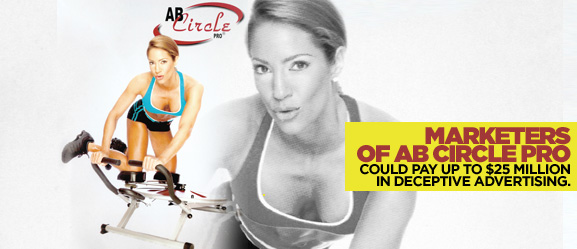Most of you visiting this site are well aware that there are no quick fixes and most gimmicks are exactly that, a gimmick. Today, the Federal Trade Commission (FTC) filed deceptive advertising charges against the marketers of the Ab Circle Pro and its pitchwoman, Jennifer Nicole Lee.

Jennifer Nicole Lee (JNL) has been a popular fitness personality and appeared in nearly every fitness magazine over the last 10 years. Many people felt she “sold out” when she took her marketing and self-promotion to new heights, while others felt she was doing what everyone wants, going “main stream”. Going “mainstream” doesn’t mean selling false hope. The FTC felt JNL and the marketers behind her ab exercise devise mislead customers and now they have to pay up. Infomercials for the Ab Circle Pro have been aired over thousands of times and one claim JNL says, “You can either do 30 minutes of abs and cardio or just three minutes a day. The choice is yours.”
The FTC complaint names as defendants Fitness Brands, Inc., Fitness Brands International, Inc., and the two individuals who control them, Michael Casey and David Brodess; Direct Holdings Americas, Inc. and Direct Entertainment Media Group, Inc.; infomercial producer Tara Borakos and two companies she controls, Tara Productions Inc. and New U, Inc.; and Jennifer Nicole Lee and two companies she controls, JNL, Inc. and JNL Worldwide, Inc.
The defendants have agreed to settlements that provide as much as $25 million – and at least $15 million – depending on the volume of refunds consumers request. If you purchased an Ab Circle Pro you may be eligible for a refund.
Court documents show that JNL Defendants received $710,480 in royalties from Ab Circle Pro sales.
Recently the FTC has ramped up its efforts to stop over-hyped health claims. In this instance the complaint filed charges all the defendants with misrepresenting that using the Ab Circle Pro allowed Jennifer Nicole Lee to lose 80 pounds.
The settlements bar all defendants other than Lee and the two companies she controls from claiming that the Ab Circle Pro or any similar device is likely to cause rapid and substantial loss of weight, inches, or fat; is likely to do so in specific areas of the body such as the abdominal area, hips, thighs, and buttocks; or makes a significant contribution to an exercise plan that provides rapid and substantial loss of weight, inches, or fat. The defendants also are prohibited from claiming that the Ab Circle Pro or any similar device, if used for three minutes a day, causes users to lose 10 pounds in two weeks; provides the same exercise benefits as doing 100 sit-ups; or provides weight- or fat-loss benefits that are equivalent or superior to longer workouts on other exercise devices or gym equipment.
The settlements also prohibit all except the Lee defendants from making fat-, inch-, or weight-loss claims for any exercise equipment, food, drug, or device unless such claims are supported by competent and reliable scientific evidence. The defendants further cannot claim that consumers using such products can generally expect to achieve the results claimed by endorsers of the products, unless such claims are supported by competent and reliable evidence.
The settlements bar the Fitness Brands, Inc. defendants from providing others with the means to make any of the representations prohibited above.
Under the settlements, the Fitness Brands, Inc. defendants will pay $1.2 million. Direct Holdings Americas, Inc.; Direct Entertainment Media Group, Inc.; and relief defendant Reader’s Digest will pay $13.8 million – and up to $10 million more, depending on the volume of refund requests.
The Commission vote authorizing the staff to file the complaint and approving the proposed consent decree was 5-0. The complaint was filed in the U.S. District Court for the Southern District of Florida on August 22, 2012.
NOTE: The Commission files a complaint when it has “reason to believe†that the law has been or is being violated and it appears to the Commission that a proceeding is in the public interest. The complaint is not a finding or ruling that the defendant has actually violated the law. The consent order is for settlement purposes only and does not constitute an admission by the defendant that the law has been violated. Consent orders have the force of law when approved and signed by the District Court judge.
The Federal Trade Commission works for consumers to prevent fraudulent, deceptive, and unfair business practices and to provide information to help spot, stop, and avoid them.
Lead image from FTC.gov
A news release from the FTC was used in part for this story.
